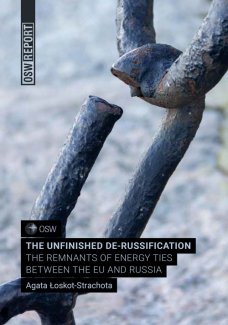The unfinished de-russification

The launch of Russia’s full-scale aggression against Ukraine and its economic war with the West have led to an unprecedented reduction in the European Union’s energy ties with Moscow. Brussels has proven more willing than many expected to shift away from importing Russian energy resources, as evidenced by sanctions imposed on imports of oil and petroleum products. During the gas crisis, the EU demonstrated its resolve to diversify its gas supply at an unprecedented pace, largely replacing the sharply declining volumes from Russia. Diversification efforts are ongoing, encompassing both energy resources and power supply networks. Following the successful emergency wartime synchronisation of Ukraine with the European power grid, the Baltic states plan to disconnect from the Russian system in February 2025.
Despite these achievements and the political goal of fully ending hydrocarbon imports from Russia, energy ties with this country have not been reduced to the same extent across all EU member states. The ongoing war renders these dependencies a risk factor for both those individual states and the Union as a whole. This is particularly evident in Central Europe, where most countries in the region still largely rely on Russian gas and oil. Since July, issues have emerged with some Russian oil deliveries, with gas transit through Ukraine likely to cease at the beginning of 2025. Russia also remains a significant player in the European and global nuclear fuel supply chain, with its companies still holding assets within the EU refinery infrastructure.




